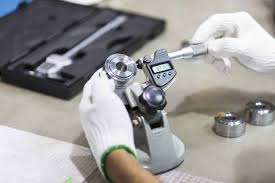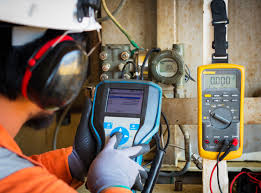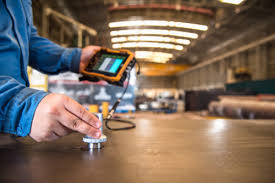مميزة
- الحصول على الرابط
- X
- بريد إلكتروني
- التطبيقات الأخرى
Calibration and Validation Techniques in Egypt: Ensuring Quality Assurance
Calibration and validation are essential techniques for ensuring the accuracy lab instruments calibration and reliability of measurement and testing equipment. In Egypt, these techniques play a crucial role in ensuring quality assurance across various industries. Calibration and validation in Egypt are incredibly important for guaranteeing the reliability and certainty of results obtained from instrumentation and testing processes. This article will explore the calibration and validation techniques in Egypt, focusing on their significance in ensuring quality assurance and the steps taken to implement these techniques effectively.
Calibration and validation techniques are crucial components of quality assurance in Egypt, particularly in industries such as pharmaceuticals, food and beverage, and manufacturing. These techniques are used to ensure that measurement instruments and processes are functioning accurately and reliably. In Egypt, the calibration and validation process typically involves comparing the performance of a measurement instrument or system to a standard reference, and making adjustments as necessary to ensure accuracy. This is particularly important in industries that are heavily regulated, such as the pharmaceutical sector, where accurate measurement and control of processes are essential for ensuring product safety and efficacy. Validation techniques in Egypt may include methods such as equipment qualification, process validation, and cleaning validation, all of which are designed to ensure that systems and processes are performing as intended and meeting regulatory requirements. These techniques are especially important in industries such as food and beverage, where strict hygiene and safety standards must be upheld. Overall, calibration and validation techniques play a crucial role in ensuring quality assurance in Egypt, helping to uphold the standards of products and processes in various industries. These measures are essential for meeting regulatory requirements, improving operational efficiency, calibration of equipment in laboratory and ultimately ensuring consumer safety.
The Importance of Calibration and Validation in Egypt's Scientific Research
New Cairo calibration lab

Calibration and validation are crucial processes in ensuring the accuracy and reliability of data, measurements, and equipment in various sectors across Egypt. Whether it is in scientific research, industrial production, healthcare, technology, or agriculture, the calibration and validation process plays a vital role in maintaining quality and adherence to international standards. By regularly calibrating and validating instruments and processes, Egypt can ensure that its data and measurements are precise, leading calibration and testing services to improved decision-making, product quality, and overall efficiency in various industries.
The importance of calibration and validation in Egypt's scientific research cannot be overstated. Accurate and reliable scientific data is crucial for the development of the country and for informing policy decisions. Calibration ensures that the measuring instruments used in research are accurate and provide consistent results. Validation, on the other hand, ensures that the methods and techniques used in research are reliable and produce valid results. Without proper calibration and validation, the integrity of scientific research in Egypt would be compromised, leading to potentially flawed conclusions and ineffective policies. Therefore, investing in calibration and validation processes is essential for the advancement of Egypt's scientific research and its impact on society.
Ensuring Accuracy: The Role of Calibration and Validation in Egypt

Ensuring Accuracy: The Role of Calibration and Validation in Egypt focuses on the importance of implementing calibration and validation processes to ensure the accuracy of measurements and data in various industries such as healthcare, environmental monitoring, and manufacturing. The article delves into the specific calibration and validation techniques commonly used in Egypt, as well as the regulatory standards and guidelines that govern these practices. It also highlights the significance of regular calibration and validation to comply with international quality standards and meet customer expectations. Additionally, the article discusses the potential challenges and best practices for implementing effective calibration and validation processes in the Egyptian context.
Challenges and Solutions: Calibration and Validation in Egypt's Industry

Calibration and validation in Egypt's industry face several challenges, including limited resources, outdated equipment, and a lack of standardized practices. Additionally, the lack of skilled professionals in this field adds to the difficulty of ensuring accurate calibration and validation processes. One solution to these challenges is investment in modern calibration equipment and technology. By updating and upgrading equipment, industries can improve the accuracy and efficiency of their calibration and validation processes. Additionally, investing in training and development programs for employees can help address the shortage of skilled professionals in this field. Furthermore, establishing standardized practices and guidelines for calibration and validation can help ensure consistency and accuracy across different industries in Egypt. This can be achieved through collaboration between industry stakeholders, regulatory bodies, and professional organizations to develop and enforce industry standards. Overall, addressing the challenges of calibration and validation in Egypt's industry requires a multi-faceted approach that includes investment in technology, training, and standardization efforts. By implementing these solutions, the industry can improve the reliability and accuracy of calibration and validation processes.
The Significance of Calibration and Validation in Egypt's Healthcare Sector
The calibration and validation of medical equipment and processes are crucial in Egypt's healthcare sector to ensure the accuracy and reliability of diagnostic and treatment procedures. Properly calibrated instruments, such as MRI machines, X-ray equipment, and laboratory testing devices, play a vital role in accurate diagnosis and treatment planning. Validation processes help to ensure that the results obtained from these instruments are consistent and reliable across different healthcare facilities. These measures are critical for maintaining the quality of healthcare services and achieving optimal patient outcomes in Egypt. Adhering to strict calibration and validation standards also helps healthcare providers comply with regulatory requirements and maintain patient trust and confidence in the quality of care they receive.
Improving Data Accuracy: Calibration and Validation in Egypt's Technology
Improving data accuracy in Egypt's technology sector involves implementing calibration and validation processes. Calibration ensures that the data collection and measurement tools are accurately aligned with standard references, while validation checks the accuracy and reliability of the data to ensure it reflects the real-world conditions. These processes are essential in maintaining the quality of data used in various technological applications, including IoT, smart city systems, and other emerging technologies. By implementing robust calibration and validation protocols, Egypt can enhance the accuracy and reliability of its technological infrastructure, leading to improved efficiency and informed decision-making.
Quality Control: The Impact of Calibration and Validation in Egypt's Agriculture
Quality control is a crucial aspect of Egypt's agricultural industry, as it ensures that products meet the required standards for both domestic consumption and international trade. Calibration and validation play a key role in quality control, as they help to verify the accuracy and reliability of measurement and testing instruments used in the agricultural sector. Calibration involves comparing the accuracy of a measuring instrument to a known standard in order to detect and correct any deviations. In the context of agriculture, this could include calibrating equipment such as pH meters, moisture meters, and temperature gauges used in soil and crop analysis. Proper calibration ensures that these instruments provide accurate and consistent results, which is essential for making informed decisions about crop management and production. Validation, on the other hand, involves confirming that a process, system, or method consistently produces results that meet predetermined specifications. In the agricultural sector, validation may be applied to techniques such as pesticide and fertilizer application, irrigation methods, and crop monitoring systems. By validating these processes, farmers and agribusinesses can have confidence in the reliability and effectiveness of their agricultural practices. Overall, calibration and validation have a significant impact on Egypt's agriculture by improving the accuracy of measurements and the reliability of agricultural practices. This leads to higher quality products, increased productivity, and improved competitiveness in the global market. Therefore, it is essential for agricultural stakeholders in Egypt to prioritize quality control through proper calibration and validation processes.
Compliance and Standards: Calibration and Validation Requirements in Egypt
Compliance and standards for calibration and validation requirements in Egypt are in place to ensure that equipment and processes meet specified quality and performance standards. In Egypt, calibration and validation are important in various industries including pharmaceutical manufacturing, healthcare, and food and beverage production. These requirements are typically governed by regulatory bodies such as the Egyptian Drug Authority (EDA) and the Egyptian Organization for Standardization and Quality (EOS). Companies operating in Egypt must adhere to these regulations to ensure the accuracy and reliability of their measuring and testing equipment, as well as the validation of their production processes. Non-compliance can result in fines, product recalls, and damage to a company's reputation. Therefore, it is crucial for businesses to stay up-to-date with the latest calibration and validation requirements in Egypt.
In conclusion, the implementation of calibration and validation techniques in Egypt is crucial for ensuring quality assurance across various industries. With these methods in place, organizations can have confidence in the accuracy and reliability of their measurements and processes. Calibration and validation in Egypt play a key role in ensuring that products and services meet international standards and regulatory requirements, ultimately contributing to the country's overall economic development and global competitiveness. It is essential for companies and institutions to prioritize ongoing calibration and validation efforts to maintain a high level of quality and reliability in their operations. Calibration and validation Egypt are vital components for achieving and maintaining excellence in various sectors.
- الحصول على الرابط
- X
- بريد إلكتروني
- التطبيقات الأخرى
المشاركات الشائعة
المنشأة الفردية في القانون المصري: الإجراءات القانونية والتشريعية المتعلقة
- الحصول على الرابط
- X
- بريد إلكتروني
- التطبيقات الأخرى